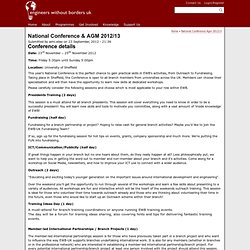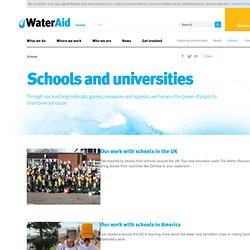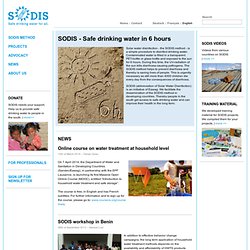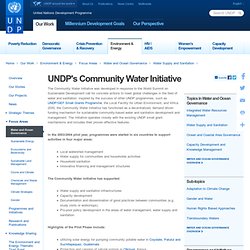

Personal.lse.ac.uk/sutton/tanzania_final.pdf. Rain Water Harvesting, Morarka NGO. To begin with we are proposing to take up water conservation initiatives in urban areas through entrepreneurial route that is business like operations under suitable policy and legislative framework by the local authorities for: • Rain Water Harvesting • Waste Water Recycling Water is the most precious gift of nature. Proper planning, development, management and optimal utilization of this vital natural resource are prerequisites for socio-economic development of the society.
Increased demographic pressure in urban areas and socio-economic advancements has increased the demand of water for drinking, commercial, agriculture and industrial purposes. Therefore, every drop of water has to be utilized wisely.
Water Supply & Sanitation - Engineers Without Borders Australia. Project Statement Access to clean drinking water is an important issue that needs to be addressed throughout the Mekong Delta region. Drinking water is currently collected from three sources: rainwater, bore wells and surface water. Rainwater is collected in open cement / ceramic jars during the wet season and will typically provide a family water for approximately six months of the year. Impurity build up in the jars is a problem. 85% of rural households have access to borehole wells with a hand pump. Well water often contains heavy metals including arsenic and is often highly saline. Although the region does not experience severe flooding on the scale of a tsunami, it does experience daily tidal variations of about 7cm.
Design Projects EWB and Habitat for Humanity invite you to consider one or more of the following design projects: Design Considerations When designing a solution, the following issues have been identified and should be considered a priority. Additional Information. Web.mit.edu/watsan/Docs/Student Theses/Rwanda/KellyDoyleThesis_Final.pdf. RWH List at JISCMAIL.AC.UK. National Conference & AGM 2012/13. Conference details Date: 23rd November – 25th November 2012 Time: Friday 5:30pm until Sunday 5:00pm Location: University of Sheffield This year's National Conference is the perfect chance to gain practical skills in EWB's activities, from Outreach to Fundraising.

Taking place in Sheffield, the Conference is open to all branch members from universities across the UK. Please carefully consider the following sessions and choose which is most applicable to your role within EWB. Presidents Training (2 days) This session is a must attend for all branch presidents. Fundraising (half day) Fundraising for a branch partnership or project? If so, sign up for the fundraising session for hot tips on events, grants, company sponsorship and much more. ICT/Communication/Publicity (half day) If great things happen in your branch but no one hears about them, do they really happen at all? Outreach (2 days) Training Ideas Day (1 day) About WaterAid Water educational resources. Our work with schools in the UK Get inspired by stories from schools around the UK.

Our new education pack The Water Resource will help bring stories from countries like Zambia to your classroom. Our work with schools in America Join students across the US in learning more about the water and sanitation crisis or raising funds for WaterAid’s work. Welcome to SODIS. Online course on water treatment at household level 10th of March 2014 – Fabian Suter On 7 April 2014, the Department of Water and Sanitation in Developing Countries (Sandec/Eawag), in partnership with the EPF Lausanne, is launching its first Massive Open Online Course (MOOC), entitled “Introduction to household water treatment and safe storage”.

The course is free, in English and has French subtitles. For further information and to sign up for the course, please go to: www.coursera.org/course/hwts. SODIS workshop in Benin 26th of September 2013 – Samuel Luzi In addition to effective behavior change campaigns, the long term application of household water treatment methods depends on the availability and affordability of HWTS products (SODIS bottles, chlorine tablets of solution, filters). Weather and Climate: Tanga, Tanzania, average monthly precipitation, Rainfall, Snow. Practical Action report on RWH. Community Water Initiative. The Community Water Initiative was developed in response to the World Summit on Sustainable Development call for concrete actions to meet global challenges in the field of water and sanitation.

Inspired by the success of other UNDP programmes, such as UNDP/GEF Small Grants Programme, the Local Facility for Urban Environment, and Africa 2000, the Community Water Initiative has functioned as a decentralized, demand driven funding mechanism for sustainable community-based water and sanitation development and management. The Initiative operates closely with the existing UNDP small grant mechanisms and includes their proven effective features. In the 2003/2004 pilot year, programmes were started in six countries to support activities in four major areas: Local watershed managementWater supply for communities and households activitiesHousehold sanitationInnovative financing and management structures The Community Water Initiative has supported: Highlights of the Pilot Phase include: Flywheel Energy Storage Device (page 41)
Water Treatment Systems.